A solid cylinder and a solid sphere both having the same mass and radius, are released from a rough inclined plane. Both roll without slipping. Then,
1. the force of friction that acts on the two is the same
2. the force of friction is greater in case of a sphere than for a cylinder
3. the force of friction is greater in case of a cylinder than for a sphere
4. the force of friction will depend on the nature of the surface of the body that is moving and that of the inclined surface and is independent of the shape and size of the moving body
एक ठोस बेलन और एक ठोस गोला दोनों समान द्रव्यमान और त्रिज्या वाले हैं, जो दृढ आनत तल से छोड़े जाते हैं। दोनों बिना फिसले लुढ़कते हैं। तब,
1. घर्षण बल जो दोनों पर कार्य करता है समान है
2. बेलन की तुलना में गोले की स्थिति में घर्षण बल अधिक है
3. गोले की तुलना में बेलन की स्थिति में घर्षण बल अधिक है
4. घर्षण बल, गतिमान पिंड और आनत सतह की सतह की प्रकृति पर निर्भर करेगा और गतिमान पिंड के आकार और माप से स्वतंत्र होगा
A ball of mass m moving with velocity collides a wall as shown in the figure. After impact, it rebounds with a velocity . The impulse acting on ball during impact is
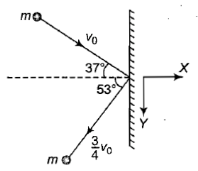
1.
2.
3.
4. None of these
जैसा कि आरेख में दिखाया गया है m द्रव्यमान की एक गेंद वेग से गति करते हुए एक दीवार से संघट्ट करती है। प्रभाव के बाद, यह वेग से वापस लौटती है। प्रभाव के दौरान गेंद पर कार्य करने वाला आवेग है
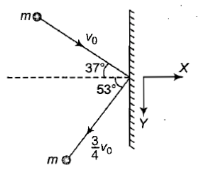
1.
2.
3.
4. इनमें से कोई नहीं
A shell initially at rest explodes into two pieces of equal mass, then the two pieces will
(1) Be at rest
(2) Move with different velocities in different directions
(3) Move with the same velocity in opposite directions
(4) Move with the same velocity in same direction
प्रारम्भ में विरामावस्था में एक कोश समान द्रव्यमान के दो टुकड़ों में टूट जाता है, तब दोनो टुकड़े होंगे:
(1) विरामावस्था में होंगे
(2) विभिन्न दिशाओं में अलग-अलग वेगों के साथ गति करेंगे
(3) विपरीत दिशाओं में समान वेग से गति करेंगे
(4) समान दिशा में समान वेग से गति करेंगे
Three indentical spheres, each of mass 1 kg are kept as shown in figure, touching each other, with their centres on a straight line. If their centres are marked P, Q, R respectively, the distance of centre of mass of the system from P is
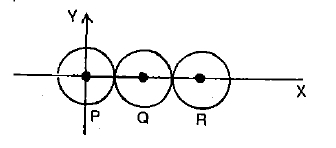
जैसा कि आकृति में दर्शाया गया है प्रत्येक 1 kg द्रव्यमान के तीन एकसमान गोले एक सरल रेखा पर अपने केंद्रों के साथ एक दूसरे को स्पर्श करते हुए रखे गए हैं। यदि उनके केंद्रों को क्रमशः P, Q, R के रूप में अंकित किया गया है, तब P से निकाय के द्रव्यमान केंद्र की दूरी है:
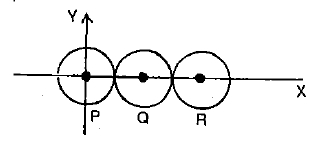
From a uniform square plate of side a and mass m, a square portion DEFG of side is removed. Then, the moment of inertia of the remaining portion about the axis AB is
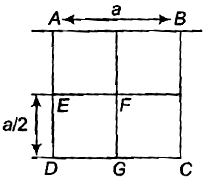
1.
2.
3.
4.
a भुजा और m द्रव्यमान की एकसमान वर्गाकार प्लेट से, भुजा के एक वर्गाकार भाग DEFG को निकाला जाता है। तब, अक्ष AB के परितः शेष भाग का जड़त्व आघूर्ण ज्ञात कीजिए।
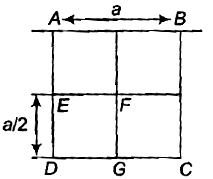
1.
2.
3.
4.
A solid sphere is rotating in free space. If the radius of the sphere is increased keeping mass same which one of the following will not be affected
1. Moment of inertia
2. Angular momentum
3. Angular velocity
4. Rotational kinetic energy
एक ठोस गोला मुक्त स्थान में घूम रहा है। यदि गोले की त्रिज्या द्रव्यमान को समान रखते हुए बढ़ाई जाती है, जो निम्न में से किसी एक पर प्रभाव नहीं डालेगी
(1) जड़त्व आघूर्ण
(2) कोणीय संवेग
(3) कोणीय वेग
(4) घूर्णन गतिज ऊर्जा
The magnitude of the impulse developed by a mass of 0.2 kg which changes its velocity from is
1. 2.7 N-s
2. 1.8 N-s
3. 0.9 N-s
4. 3.6 N-s
0.2 kg के द्रव्यमान से विकसित आवेग का परिमाण जो इसके वेग को परिवर्तित करता है, है:
1. 2.7 N-s
2. 1.8 N-s
3. 0.9 N-s
4. 3.6 N-s
If rotational kinetic energy is 50 % of translational kinetic energy, then the body is
1. Ring
2. Cylinder
3. Hollow sphere
4. Solid sphere
यदि घूर्णन गतिज ऊर्जा, स्थानांतरीय गतिज ऊर्जा का 50% है, तब पिंड है :
1. वलय
2. बेलन
3. खोखला गोला
4. ठोस गोला
A ball hits the floor and rebounds after an inelastic collision. In this case
1. the momentum of the ball just after the collision is the same as that just before the collision
2. the mechanical energy of the ball remains the same in the collision
3. the total momentum of the ball and the earth is conserved
4. the total energy of the ball and the earth is conserved
एक गेंद फर्श पर टकराती है और एक अप्रत्यास्थ संघट्ट के बाद वापस लौट जाती है। इस स्थिति में
1. संघट्ट के ठीक बाद गेंद का संवेग वही है जो संघट्ट से ठीक पहले था
2. संघट्ट में गेंद की यांत्रिक ऊर्जा समान रहती है
3. गेंद और पृथ्वी का कुल संवेग संरक्षित है
4. गेंद और पृथ्वी की कुल ऊर्जा संरक्षित है
If the equation for the displacement of a particle moving on a circular path is given by , where is in radian and t is in second, then the angular velocity of the particle after 2s is
1. 8 rad/s
2. 12 rad/s
3. 24 rad /s
4. 36 rad/s
यदि एक वृत्ताकार पथ पर गतिमान एक कण के विस्थापन के लिए दिया गया समीकरण है, जहां रेडियन में है और t सेकेण्ड में है, तब 2s के बाद कण का कोणीय वेग है:
(1) 8 rad/s
(2) 12 rad/s
(3) 24 rad/s
(4) 36 rad/s







